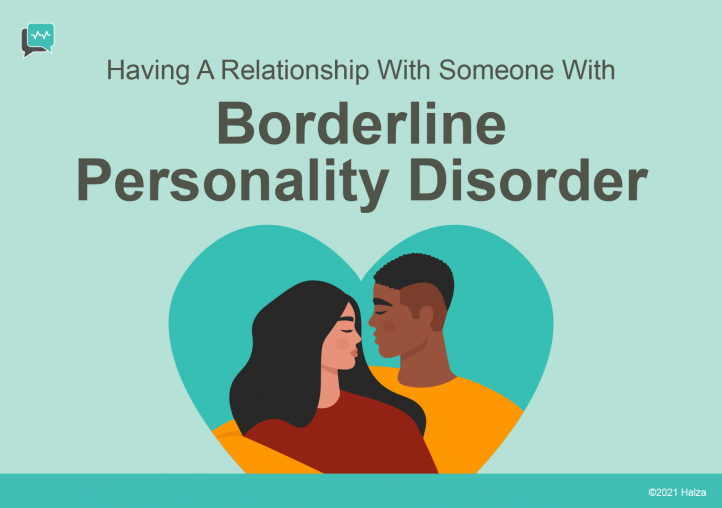Love Someone With Borderline Personality Disorder

Why might your new partner’s personality seem to dramatically change just when things seemed to be going so well?
One moment they explode in anger, the next moment they are apologetic, a bit later they might even seem euphoric. You suddenly notice that they interpret things you say in the most negative way. They begin to accuse you of wanting to leave the relationship. They impulsively harm themselves. They might even threaten to take their own life.
Symptoms of borderline personality disorder (BPD) differ from person to person, but virtually everyone with BPD experiences dramatic, intense shifts in emotion and mood. Unlike in mood disorders such as depression or bipolar disorder, the mood shifts of BPD occur specifically in the context of an interpersonal relationship. This means that being in a relationship with a person with BPD requires tremendous self-awareness, understanding, a willingness to forgive, and perhaps most of all, emotional strength.
Why do these intense emotional shifts happen, and how can you help?

Borderline personality disorder is thought to arise from a combination of neurobiological and environmental factors, including a history of childhood trauma. (for more information see this article: What is Borderline Personality Disorder)
People with borderline personality disorder typically have a great fear of abandonment. They can believe that the smallest, most innocent comment or action is a sign that their partner is going to leave them. This fear can paradoxically lead to behavior – such as obsessive possessiveness or neediness – that seems designed to drive their partner away.
For example, a person with borderline personality disorder seeing their partner pack for a routine overnight business trip might believe that their partner is leaving them. In a panic, they might phone their partner ten or even fifteen times the next day. The partner might insist that the person with BPD stop phoning during the workday. Being told not to phone reinforces the fear of abandonment.
In addition, something that most people find only mildly offensive in a partner can feel overwhelmingly horrible to a person with BPD. Because they lack the skills to regulate their emotions, they might erupt in a rage. They simply don’t know how to manage an uncomfortable feeling. The partner is left floored by how dramatically they reacted to a minor event.
Yet only an hour or a few hours later, the person with BPD might shower the partner with love, declaring that they are completely perfect.
In an effort to avoid triggering reactions, the partner of the person with borderline personality disorder spends a lot of time walking on eggshells. The extreme positions are exhausting to keep up with.
How can I manage my relationship with my partner?

- Learn as much as you can from reputable websites or a mental health professional about borderline personality disorder.
- Try to figure out what sets off your partner’s reactions. For example, is it often jealousy? Disorganization? Thoughtlessness?
- If your partner is angry over something that seems trivial to you, don’t point out that the matter is unimportant. Instead, try to understand the underlying emotion that is driving your partner’s reaction.
- Remain calm. When a person feels out of control of their emotions it can be helpful to be with a person who is in control of theirs. However, if you can’t remain calm it is usually best to walk away.
- Help your partner avoid stressful situations. If stress is unavoidable, figure out how to help your partner minimize the stress.
- If you sense that your partner is in a fragile state, you can try to distract them. Offer to watch TV, play a game, do a puzzle, or any activity you enjoy together.
- Make sure your partner is receiving therapy. Expect change to come slowly. Recovery from BPD requires that they learn to understand and manage their emotions, which is a difficult process.
- Respect your partners readiness to face the disorder. You can certainly praise your partner for their efforts but be careful not to minimize their struggle or expect dramatic change in a short time.
- Encourage your partner to develop a support network of understanding friends and family. Discuss what level of information your partner is comfortable sharing with outsiders.
- When things are calm and relaxed, discuss limits. Make sure that your partner understands what behavior you consider unacceptable. It can be helpful to have this conversation with a therapist, if possible. Be prepared to enforce the consequences you have laid out.
- Take any threat of suicide very seriously and never hesitate to call an ambulance.

As important as it is for your partner to receive treatment, it is also important that you find a source of support for yourself. Speaking to a therapist who understands your relationship can be very helpful, as can joining a therapist-led support group. These options are usually available online and in some locations in person. Additionally, continue to see your own family and friends, and as much as possible, stay involved with your work and/or your hobbies. Try not to let yourself be defined by the turmoil in your relationship.
And as always, getting enough sleep, eating well, and participating in physical activity are essential to helping you cope with stress.
None of these suggestions are easy, but they do get easier. They also provide the best chance for a long lasting and strong relationship.
How Halza Can Help:
Manage you and your family’s health easily with the Halza app!
Store, track & share all of your child’s medical records to have them with you, wherever you go. Monitor your child’s growth and vaccination schedule as well as upload reports and doctor’s notes all with the Halza app. QuickShare a complete overview of you or your child’s health with any attending doctor in seconds, during emergencies or whenever you need.
Simplify your health journey with Halza.